Update On MASSDA Land Company Limited

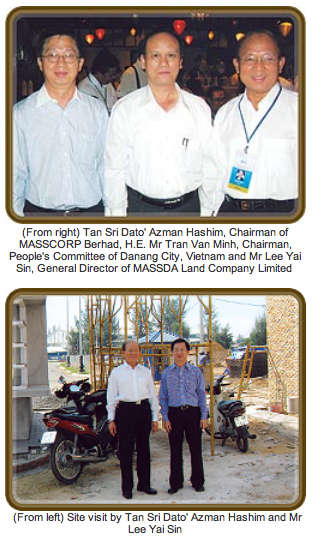
Tan Sri Dato’ Azman Hashim, Chairman of MASSCORP Berhad, visited MASSDA Land Company Limited in Danang City, S.R. Vietnam in August 2009. MASSDA Land is the developer of Danang Industrial Park and the residential development, “Fortune Park @ Son Tra” in Danang.
Danang City is one of the five biggest cities and is situated at the centre of Vietnam. Danang is an important communications hub of the central region with an international airport, deep water seaports and north-south land routes and railways. The city is also a gateway to the Pacific Ocean of the East West Economic Corridor, connecting the neighbouring countries of Laos, Northeast Thailand, Myanmar and Central Vietnam. Danang has a coastline of 30 kilometres and has beautiful beaches stretching from the north to the south. The famous Non Nuoc Beach in Danang has been voted as one of the most beautiful and attractive beaches of the world in 2005 by Forbes Magazine. This beach has gentle slopes, mild waves, and beautiful blue sea water during the four seasons.
Danang City has a growing population of 860,900 and supplies hardworking and trainable workforce for the many industries and businesses. MASSDA’s Danang Industrial Park is fully occupied by 43 investors, employing more than 12,000 workers.
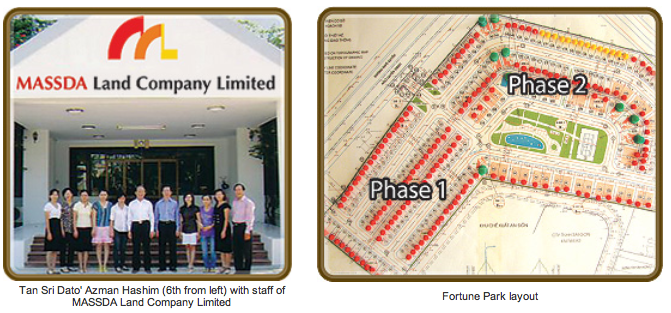
MASSDA’s flagship residential development “Fortune Park @ Son Tra” is themed “A Residential Development Inspired by Nature” and is a gated area comprising double-storey link houses, double-storey link villas and villas featuring contemporary designs by Malaysian architects and consultants.
The construction of 90 units of double-storey link houses for Phase 1 has reached 60%. The houses are scheduled to be completed in June 2010. All the 90 units launched in Phase 1 in May 2009 was fully sold within 3 weeks of the launch. Infrastructure works for Phase 2 of the development has been completed. The second phase will comprise 70 units of double-storey link houses, 38 units of double-storey link villas and 12 units of villas. MASSDA will launch the sales of Phase 2 in 2010 and is confident that these units will be well received by the local community.
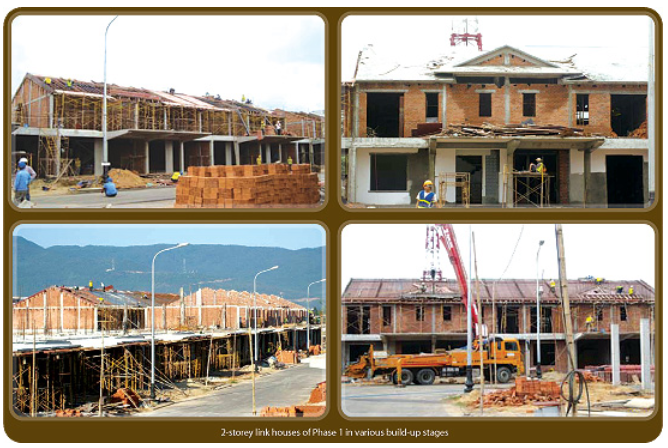
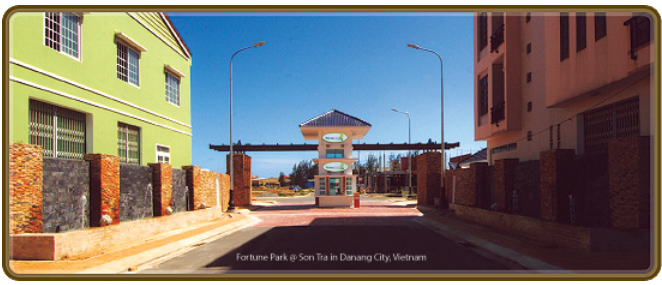
MASSDA Land Company Limited
An Don, An Hai Bac Ward, Son Tra Dist., Danang City, S.R. Vietnam.
• Tel : 84-511-3844375 / 84-511-3844376
• Fax : 84-511-3844374
Email : massda@dng.vnn.vn
Malaysia Business Chamber Vietnam
 Among the Malaysia Business Chamber’s many accomplishments of 2008 – 2009 have been the carefully designed networking events, varied social activities which also provided informal networking opportunities, the celebration of special occasions and the philanthropic activities, all under the direction of Dr. Shimi, President of MBC.
Among the Malaysia Business Chamber’s many accomplishments of 2008 – 2009 have been the carefully designed networking events, varied social activities which also provided informal networking opportunities, the celebration of special occasions and the philanthropic activities, all under the direction of Dr. Shimi, President of MBC.
Social activities are the prime catalyst for growth in any business chamber and MBC did its part in 2008 – 2009, bringing together members of the Kelantan Malay Chamber, the Thai, Singapore, Hong Kong, British, Indian, Swiss and Nordcham business groups, among others, with MBC members for a variety of events.
Throughout 2008, MBC held specific and informal Networking Nights at various venues in the city. Some of the most successful events were Karaoke Nites at the Royal Club (May), a Chinese New Year/Tet celebration for 480 invitees (Feb), the MBC Merdeka Golf Charity Dinner for 350 guests and Halloween Night at the Victoria VIP Club (Oct).
Other major MBC events of 2008 were the Chap Goh Meh Dinner (April), the Badminton Close Tournament (May), a visit to the Long Hoa Orphanage on International Children’s Day (June), the MBC Merdeka Golf and Charity Dinner (Aug), and the Deepa Raya Celebration Dinner (Nov).
Charitable donations, long a reflection of Malaysian corporate and business social responsibility, hit a new high in MBC’s history. On Children’s Day the HCMC Cancer Centre received a gift of VND70,000,000 from MBC and Operation Smiles received VND180,000,000 from the Merdeka Golf Tournament and Gala Dinner.
In 2009, MBC kept up the momentum of 2008 with more networking activities, seminars and charitable giving, including a VND10,000,000 donation made by Dr. Shimi to Vietnamese Dioxin Victims; VND55,000,000 for the HCMC Cancer Centre, VND10,000,000 for the Education Fund of Nguyen Thai Binh ward, VND75,000,000 for the Saigon Times Foundation.
Hard work, motivation and fun contributed to the 2008 – 2009 success of the Malaysia Business Chamber. Congratulations to the many MBC members and to Dr. Shimi whose dedication to Malaysian business in Vietnam created a banner year.
About MBC
MBC is a non-governmental, not-for-profit, non-political organisation registered in Vietnam. It was established in 2000 to assist the Malaysian business community and help build stronger business relationships with the Vietnamese authorities and other foreign companies. MBC brings together Malaysians from diverse business backgrounds through an exciting line-up of events, programmes and community initiatives. In its role as facilitator, MBC provides a dynamic platform for its members to meet, share and exchange ideas, information and expertise.


Executive Committee Of MBC
(For term May 2009 to May 2011)
President : Dr. Shimi Sumathi Muthu Kunju
Senior Vice President : Mr. Calvin H J Yau
Vice President : Mr. Suresh G Kumar
Honorary Secretary : Mr. Teoh Cheng Kooi
Treasurer : Ms. Vivian Yaw
Committee Members : 1. Mr. Zuraidi Saisi
2. Mr. Tengku Ferdenen Tengku Amri
3. Mr. Lim Shiu Beng
4. Mr. Kenny Lim
5. Mr. Leh Thiam Guan
MBC Membership categories
There are currently four categories of membership.
For full details, please log on to www.mbc.vn
i. Ordinary Corporate Membership
For companies, corporations and organisations which are incorporated in or established under the laws of Malaysia, and those which have a legal presence in Vietnam in a form permitted by the laws of Vietnam.
The Annual Subscription Fee for Ordinary Corporate Membership is US$600. A one-time Joining Fee US$10.00 is applicable.
ii. Ordinary Individual Members
For citizens and permanent residents of Malaysia, aged 18 years and above, who are ordinary residents of Vietnam interested in business, trade, investment and/or other permitted activities in the country.
The Annual Subscription Fee for Ordinary Individual Members is US$120.00. A one-time Joining Fee of US$10.00 is applicable.
iii. Associate Members
Membership is open to anyone working in Vietnam (non-Malaysian), in Malaysian or non-Malaysian companies.
The Annual Subscription Fee for Associate Members is US$60.00. A one-time Joining Fee of US$10.00 is applicable.
iv. Spouse Members
Open to spouses of Members from all categories of membership. Membership is free.
Contact Details:
Malaysian Business Chamber Vietnam
Room 201, 2nd Floor, 91 Ky Con St.
Nguyen Thai Binh Ward, Dist. 1
Ho Chi Minh City, S. R. Vietnam
Telephone : +84 (8) 3915 1419
Fax : +84 (8) 3915 1420
Email : info@mbc.vn
Website : www.mbc.vn
Bina Puri Holdings Berhad


Bina Puri Holdings Bhd is a public listed construction company on the Main Board of Kuala Lumpur Stock Exchange, with 34 years work experience in civil and building construction both locally and internationally. The Group’s diverse business activities include investment holdings, civil and building engineering management, property development, highways concessionaire, quarry operations, manufacturing of construction material and polyurethane system house.
The Group is certified with MS ISO 9001:2000, OHSAS 18001, MS 1722 Certifications and has won many accolades worthy of mention including the Prominent Player Award 2005: Malaysian Construction Industry Excellence Awards 2005 (MCIEA 2005), the Contractor Awards 2007: Grade G7 (MCIEA 2007) and the international Achievement Award (MCIEA 2008) awarded by the Construction Industry Development Board if Malaysia.
Bina Puri had successfully completed projects like roads and highways, bridge works, airport works, waterworks, residential and commercial buildings hotels, hospitals, Government complexes, embassy complex and has Operations Offices in Thailand, United Arab Emirates, Pakistan and Brunei Darussalam.

 Core Business: CIVIL AND BUILDING CONSTRUCTION
Core Business: CIVIL AND BUILDING CONSTRUCTION
Today, Bina Puri is one of the leading construction companies in Malaysia with a large pool of dedicated, qualified and experienced professionals as well as substantial heavy machinery resources in hand, and a proven track record in handling various types of contracts. With the Group’s current book order standing at RM2.38 billion, Bina Puri continues to bid for new projects, both locally and internationally.
Bina Puri has completed three major highways in India, including the Vijayawada-Eluru Expressway and Tada-Nellore Expressway in Andhra Pradesh and the Chittorgarh-Mangalwar Highway in Rajasthan, a luxurious five star hotel in Kathmandu, Nepal, the Malaysian Embassy and Ambassador’s Residence Building in Beijing, China and an Access Road for the New Bangkok International Airport Project in Bangkok, Thailand. Bina Puri (Thailand) Ltd., which ventured into Thailand’s construction sector in 2003, is undertaking the construction of 40,000 units of affordable housing under the National Housing Authority of Thailand and Private Development projects at various locations in the suburb of Bangkok and nearby provinces i.e. in Bangplee, Romklao, Bang Pu, Krasaebon, Rama II, Tha Jean, Na Dee, Nong Joak, Suang Lung District and Hatai Rai.
In Abu Dhabi, United Arab Emirates, Bina Puri is currently constructing 45-storey residential towers in Al Reem Island, while in Lahore, Pakistan, Bina Puri has two projects progressing very well; the construction of 174 villa units and foundation works for the Club House, both at the Defence Raya Golf & Country Club. Other overseas activities include a contract from The Brunei Economic Development Board for the construction of 2,000 houses for the National Housing Scheme of Brunei Darussalam.
Locally, we have completed the construction of Kompleks Dewan Undangan Negeri Sarawak in Kuching, Sarawak. Other ongoing projects include the Terrace Houses Development in Papar, Sabah; the construction of Universiti Malaysia Kelantan, the construction of the Central Lecture Hall and Post Graduates Centre for Universiti Malaysia Sabah, Kota Kinabalu, Sabah, the construction of the Plaza Merdeka Complex in Kuching, Sarawak, the construction of The Regalia Service Apartment in Jalan Kuching, Kuala Lumpur and the construction of shop offices in Alamesra, Kota Kinabalu, Sabah.
Our associate company, KL-Kuala Selangor Expressway Bhd (KLSEB), which is 50% owned by Bina Puri and also the concessionaire for the KL-Kuala Selangor Expressway (KLS Expressway), started construction of the RM958 million expressway on 28 October 2008 and is targeting it to be completed by 2011. It is a 33km dual carriageway expressway which will provide an alternative link road to the present Federal Route 54 from Kuala Lumpur to Kuala Selangor. It also forms part of the Malaysian Government’s planned KL Outer Ring Road (KLORR) which commences from the North Templer Park to Assam Jawa town in the District of Kuala Selangor, Selangor Darul Ehsan.

 BINA PURI HOLDINGS BHD (207184-x)
BINA PURI HOLDINGS BHD (207184-x)
Wisma Bina Puri
88, Jalan Bukit Idaman 8/1, Bukit Idaman, 68100 Selayang,
Selangor Darul Ehsan, Malaysia
Tel : (603) 6136 3333 Fax : (603) 6136 9999
E-mail : corpcomm@binapuri.com.my
Website : www.binapuri.com.my
3rd Quarter 2009 Update: Malaysian Economic Outlook

Various economic indicators continued to show improvement ahead, albeit being subjected to occasional pullbacks. This progress is brought about by the efforts of numerous national policy stabilisation measures. Some countries may start to normalise their policies first, while others, depending on their economic conditions among other things, may opt to do so later.
In October 2009, the IMF anticipated the global economy to expand by 3.1% yoy in 2010, from a 1.1% yoy decline in 2009. For 2010, the US is project to grow by 1.5% yoy, the euro zone at 0.3% yoy, Japan at 1.7% yoy, and China 9.0% yoy. The comparable yoy figures in 2009 are -2.7% (U.S.), -4.2% (euro zone), -5.4% (Japan), and +8.5% (China).
Regionally, the ADB has also lifted its GDP growth forecast for developing Asia to +3.9% yoy in 2009 and +6.4% yoy in 2010. The regional economies are seen to be more resilient to the downturn than initially feared. Underpinning the region’s growth prospects is China, whose aggressive monetary easing and fiscal stimulus could accelerate the GDP growth rate to +8.2% yoy in 2009 and to +8.9% yoy in 2010.
In 3Q09, Malaysia’s GDP improved to -1.2% yoy (2Q09: -3.9%) due to a rebound in the manufacturing, construction and services sectors. Stabilising global and domestic demand conditions resuscitated manufacturing output, while large public expenditure contributed to expansion in both construction and services activities. Nevertheless, the external sector remained relatively weak in 3Q09.
To enhance the image of Malaysia to foreign investors, liberalisation measures were implemented on 27 services sub-sectors in April 2009 and the 30.0% Bumiputra equity requirement for newly listed companies was removed in June 2009. Moreover, the personal income tax rate will also be reduced from 27.0% in 2009 to 26.0% in 2010. A special income tax rate of 15.0% will be given for local residents and foreigners who work and stay in Iskandar Malaysia.
In tandem with regional economic performances, monthly Malaysian indicators have also signalled improvement. For instance, the IPI declined at a slower rate of 6.0% yoy in September 2009 (-7.0% in August 2009) due to stabilising conditions on both the local and external fronts.
Overall consumer price inflation declined at a slower rate of 1.6% yoy in October 2009 (-2.0% in September 2009) due to lower base effects. Moreover, consumer inflation also increased by +0.1% mom in October 2009 (+0.3% in September 2009). Consumer inflation remained positive at 0.6% on a year to month basis. Core consumer inflation declined at a slower rate of 2.6% yoy in October 2009 (-3.4% in September 2009).
Meanwhile, the Central Bank of Malaysia (BNM) has left the Overnight Policy Rate (OPR) unchanged at 2.00% for the sixth consecutive meeting in November 2009. While the economic contraction is expected to decrease from 3Q09, the monetary policy stance is expected to be fairly accommodative until the economy is out of the woods. This is also facilitated by the absence of inflationary expectations in the near term. Hence, MIER expects the OPR to be relatively unchanged at least until 2H10.
Moreover, this is also supported by the fact of cautious sentiments captured by the in-house Consumer Sentiment (CSI) and Business Conditions Indices (BCI). Ongoing economic uncertainties due to global financial deleveraging activities, low wage growth, and the possibility of a sudden withdrawal of economic stimuli continued to repress confidence among consumers and corporate entities. While both CSI and BCI settled above the crucial 100-point mark in 3Q09, the rate of change has decreased quarter-on-quarter. (CSI: 105.4 in 3Q09, 105.8 in 2Q09; BCI: 113.7 in 3Q09, 105.3 in 2Q09).
There are glimmer signs that the global downturn has stabilised somewhat, but the recovery is expected to be sluggish and uneven. The healing from the current crisis will be difficult compared to previous ones because of the synchronised nature of the downturn. It will take time and huge resources to revive the deeply entangled US financial sector while policy options are running out. The weak external sector will impede a faster recovery, and the lower commodity prices are not helping either. Banks are becoming more cautious as bad loans could rise soon, limiting the flow of funds to firms. The services sector will be the pillar of strength amidst a glum manufacturing sector. The technical recession is likely to end in 4Q09. However, Malaysia may not regain more strength until the global economy is back on track, which is going to be at a disappointingly slow pace.
In view of improving macroeconomic indicators, and somewhat better CSI and BCI as well as the sectoral indices, MIER is maintaining for now its GDP growth forecast of -3.3% yoy in 2009 and +3.7% yoy in 2010, while concomitantly projecting a 2011 GDP growth forecast of +5.0% yoy. Downside risks are still prevalent and might perturb the road to recovery, but there are stronger positive influences that support MIER’s projections.

Chile: Business Opportunities From The Southern Tip Of The World
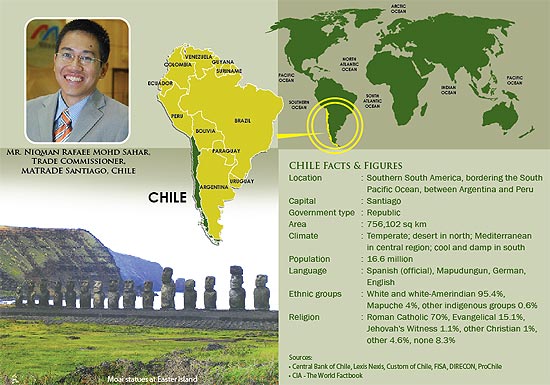
Overview
A key market in South America, Chile is also the gateway to markets like Argentina, Bolivia and Peru. Santiago is the country’s capital city. With a population of 7 million, Santiago is the most important region for business. Major companies, foreign investors, hotels and banks are all based in this city.
Chile’s two largest ports are located nearby Santiago, namely the Port of San Antonio and Port of Valparaiso. They facilitate strong transportation links and better movement of goods within cities and providing good market access. Chile’s largest port and the busiest port on South America’s west coast, the Port of San Antonio transfers over 12.6 million tons of cargo annually. It has excellent access to roads and rail to Santiago, Southern Chile, and Argentina. The Port of Valparaiso is one of Chile’s most important urban centres. The city is a centre for education and important industries are culture, transport, and tourism. In 2003, its historic quarter was designated a UNESCO World Heritage Site.
Chile also has two important Free Trade Zones located north and south of the country. The Iquique Free Trade Zone (known as Zofri), is located north of Chile. Companies based in Zofri enjoy special tax benefits and exemptions. The other is the Punta Arenas Free Trade Zone at the southern part of Chile.
Economy
Chile’s economic growth decreased 2.5% in 2009 from an estimate of 3.5% last year. The deceleration is mainly due to the global slowdown and deteriorating international financial conditions. In the coming year, Chile’s performance is expected to be driven by public spending, domestic investment and private consumption. The GDP is reported to have an outlook growth of about 4% in 2010.
Thanks to its open economy, Chile’s total trade in 2008 grew 16.2% to US$126.1 billion from US$108.5 billion one year ago. Exports rose by 5.6% to US$69.6 billion while imports increased 32.3% to US$56.5 billion. The Chilean trade balance finalised with a surplus of US$13.1 billion for the year 2008.
The United States remained Chile’s major trading partner – accounting for 14.8% of trade, valued at US$18.7 billion. This was followed closely by China with US$16.7 or 13.2% of the market share. Three of the Top 5 Chilean Global Trading Partners are from Asia (China, Japan and ROK), collectively accounting for 26.7% of the market share. Among ASEAN countries, Thailand heads the list with a total trade of US$0.6 billion, followed by Indonesia and Malaysia.
Bilateral Trade with Malaysia
In 2008, bilateral trade between Malaysia and Chile totaled US$336 million – an increase of 38.25% from the previous year. The trade balance remains in favour of Malaysia with a surplus trade value of US$38 million. Malaysia’s exports to Chile were valued at US$186.8 million, of which 52.65% is attributed to the export of automatic data processing machines into Chile. Besides the electrical and electronic sectors, Malaysia’s other exports are from the apparel and clothing, furniture and palm oil sectors.
Investment Opportunities
Taking into account its strategic location in the Southern Cone and blessed with a stable political and economic environment, Chile remains an important investment attraction among foreign investors. There is tremendous potential in the Information, Communication & Technology (ICT), construction, infrastructure, mining and property sectors. Already established as a launching hub for ICT in the region, Chile is also actively promoting the tourism, health and alternative energy sectors.
2009 was a great year for Malaysia’s exposure in Chile. Our home-based wireless provider, P1 Network Sdn Bhd, was awarded a multimillion dollar project to supply wireless internet service to rural areas across Chile. Another company, My Copter Aviation Sdn Bhd was also awarded a contract to service and refurbish helicopters owned by the Chilean Navy. These achievements complement other notable Malaysian investments in Chile, including Masscorp Chile and Safcol Chile SA (owned by Tropical Canning Sdn Bhd).
Potential areas for Malaysian Exporters
Malaysia is well known in Chile as a provider of quality products. We are currently the number one supplier of examination and surgical gloves in the Chilean market. There is also demand for Malaysian made furniture like outdoor rattan furniture, sofas, wooden chairs and office furniture.
Opportunities can be found in areas such as disposable medical products, pharmaceuticals, building materials, cosmetics, auto parts and accessories, fashion apparel, education materials, toys and gifts, construction machinery, packaging materials, canned food, beverages and so much more. In the services sector, emphasis should be given to the promotion of IT services, construction and engineering, power generation, oil and gas exploration as well as biotech.
Doing business in Chile
South American buyers are becoming aggressive and demanding. Retailers, distributors and importers are seeking the best sourcing options to expand throughout the region and earn better profit margins. Chinese products are thriving in this market due to their low-cost and a high volume strategy. The competitive landscape will require Malaysian exporters to demonstrate flexibility and reliability. Knowledge in the Spanish language will be an added advantage. Forming an alliance with a local representative or distributor who is familiar with the local business scenario and operations is a good way to market Malaysian products here successfully.
Free Trade Agreements
Negotiations of bilateral trade have been used as an important marketing tool by Chile. To date, Chile has signed 20 trade agreements with 57 countries giving market access to more than 2 billion people. The current business trend is on doing business with Asia, in particular with Malaysia, Vietnam and Thailand. This provides the impetus for Malaysian companies to start venturing and establish partnerships here. Currently, Malaysia is at the final stage of trade negotiation with Chile. Once concluded, this will further expand opportunities between both countries, taking advantage of the tariff reduction under the preferential agreements offered from the general 6% import tariff.
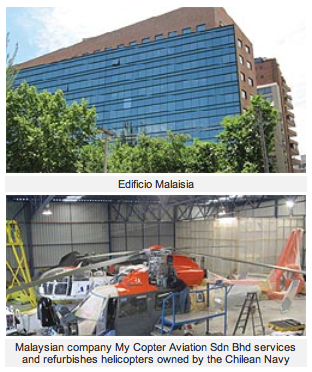 Contact Details:
Contact Details:
Mr. Niqman Rafaee Mohd Sahar,
Trade Commissioner, MATRADE Santiago,
Oficina Comercial De Malasia, Embajada De Malasia,
Avda. Tajamar 183, Oficina 302, Las Condes,
Santiago, Chile.
Telephone : 56-2-234 2647
Fax : 56-2-234 2652
Email : santiago@matrade.gov.my
Website : www.matrade.gov.my
Malaysian Investments in Chile
MASSCORP (CHILE) S.A,
Datuk Juan Claudio, Managing Director,
Av. Tajamar 183, Of. 1001, Santiago, Chile.
Telephone : 56-2-234 2679
Fax : 56-2-234 2678
Email : masscorp@entelchile.net
SAFCOL CHILE S.A,
Mr. Tee Lee Hoe, General Manager,
Camino Chinquihue KM.8, Casilla 49-D,
Puerto Montt, Chile.
Telephone : 56-65-257 160/257 161
Fax : 56-65-257 623
Email : teeleehoe.safcol@surnet.cl
Editorial
Eleven (11) Memorandum of Understandings (MOUs) were inked between Malaysian delegates and their Zambian counterparts during the Business Mission to Zambia that took place from 2 to 7 December 2009. This mission, organised by MATRADE, CIDB and MASSA, focused on the Construction and Education sector. It received the highest support from the Zambian authorities including His Excellency Rupiah Banda, the President of Zambia. We congratulate the delegates and would like to express our continuing support for them to realise their business ventures. We thank MATRADE and CIDB, especially our EXCO member YBhg Dato’ J. Jegathesan, for their support and cooperation for this successful business mission.
The global economic environment went through a tumultuous period in the last two years. In this edition, we have Malaysian Institute of Economic Research (MIER) and Thierry Apoteker Consultant (TAC) giving their respective views on the economic performance for Malaysia to date and the global outlook for 2010. We have also featured Chile and Vietnam in this edition and an update on Masscorp Bhd’s investment in Danang, Vietnam.
As the year comes to a close, we want to express our thanks to all members, associates and sponsors for assisting us in the publication of this newsletter. We look forward to working closely with all of you to build a bigger and better platform for South-South collaborations in the coming new year.
Do continue to look out for our weekly notices and circulars that will be delivered to your mail boxes. We encourage members and their business associates to join us in the activities and networking events that have been organised.
As we usher in the New Year, we in the Editorial team wish all members and readers, “Season’s Greetings” and a “Happy New Year”.
Fatimah Sulaiman
Editor
President’s Message

The global and financial environment of the past two years has been extremely challenging. The swift, strong and coordinated policy responses around the world had helped to restore stability and the much feared deep recession seems to have been averted. The challenge now is to ensure that the recovery momentum can be broadened and sustained.
Going forward, the global financial crisis has set in motion a transformation process for the new world. Asia is emerging as one of the most vibrant regions and will increasingly play a critical role in determining the shape of the future global economic landscape. In this regard, Malaysia must position itself to seize the emerging business opportunities in order to benefit from the growing economic integration and dynamism in Asia.
While the level of competition will intensify within Asia, the challenge for Malaysian entrepreneurs will be to identify areas of comparative advantage and fully leverage on the complementarities that these emerging economies will present. In this regard, niche growth segments especially in the services sector, broadband and green technology amongst others, will present new sources of business opportunities. These opportunities can, in turn, be strategised to enhance our economic linkages with the emerging economies of the South.
We are pleased to note that our economy had registered two consecutive quarters of quarter-on-quarter growth, growing by 4.8% and 5.7% in the 2nd and 3rd quarter respectively. The 4th quarter Gross Domestic Product (GDP) is positive and recovery is expected to gather strength in 2010. This augurs well for the future as we strive to complement our Government’s efforts in our economic recovery process.
As the year comes to a close, I wish to express MASSA’s gratitude to our Government and members for their continuing support of our activities and initiatives.
To all MASSA members and Executive Committee members, I thank you for your valuable participation and contribution to the Association and wish you and your families “Season’s Greetings” and a “Happy and Successful 2010”!

TAN SRI DATO’ AZMAN HASHIM
President
Diary Of Events
Showcase Bangladesh 2010 in Kuala Lumpur, 8 – 10 January 2010
The Bangladesh-Malaysia Chamber of Commerce & Industry (BMCCI) in collaboration with the Bangladesh High Commission in Kuala Lumpur organised the Showcase Bangladesh 2010 at Putra World Trade Centre (PWTC), Kuala Lumpur. This event is supported by Malaysia South-South Association (MASSA) and the Federation of Malaysian Manufacturers (FMM).
Besides introducing and promoting Bangladeshi products and services to potential buyers and importers from Malaysia, this showcase also highlighted activities which include infrastructure development, trade promotion and tourism development, cross border investment as well as women leadership and entrepreneurship development. YB Dato’ Sri Mustapha bin Mohamed, the Honourable Minister of the Ministry of International Trade and Industry, Malaysia inaugurated the Opening Ceremony on 8 January 2010 with Special Guest from the Government of Bangladesh, the Honourable Mr Muhammad Faruk Khan, MP, Minister of Commerce. Mr Syed Moazzam Hossain, President of BMCCI delivered the Welcome Address while H.E. Mr AKM Atiqur Rahman, High Commissioner of Bangladesh in Kuala Lumpur delivered the Opening Speech at this event.
A Cross Border Investment Seminar on “Relocation of Sun Set Industries and Infrastructure Development” and a special Seminar on “SEACO” were also held for Malaysian businessmen on 8 January 2010. On 9 January 2010, a Gala Dinner cum Cultural Show was held at Best Western Premier Seri Pacific Hotel, Kuala Lumpur. YABhg Tun Dr. Mahathir Mohamad, former Prime Minister of Malaysia was the Chief Guest at this dinner with the Honourable Dr. Hasan Mahmud, MP, State Minister for the Ministry of Environment & Forests, Bangladesh, the Special Guest. President of MASSA, YBhg Tan Sri Azman Hashim, attended both of these events.
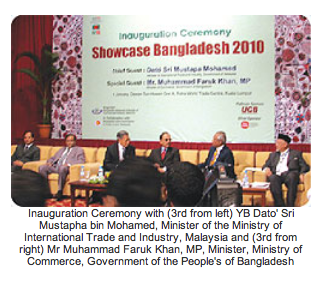 A total of 36 exhibitors participated at this showcase which included the following Bangladeshi products and services:
A total of 36 exhibitors participated at this showcase which included the following Bangladeshi products and services:
- Banking and Insurance Services
- Ceramic Tablewares
- Cosmetic and Toiletries
- Halal Food including Frozen Foods and Allied Products
- Handicraft and Handloom Products
- Home Textiles
- Hostel and Tourism
- Jute and Jute Products
- Leather Products
- Pharmaceutical, Herbal and Ayurvedic Products
- Plastics and Melamine Products
- Ready-made Garments (both woven and knitted)
- Real Estate and Housing
- Silk and Accessories
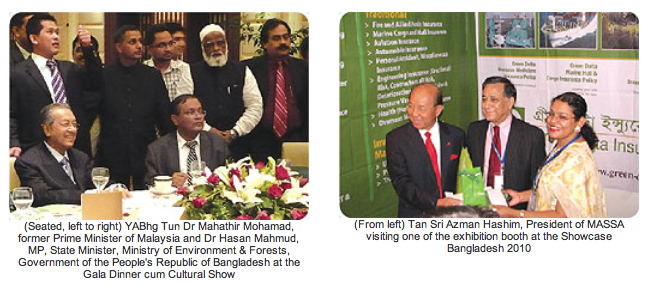
Visit of Ecobank, West Africa to MASSA, 21 January 2010
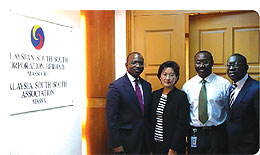 Mr Paulo Gomes, Director of Ecobank Transnational Inc., Togo, Mr Didier Acouetey, Executive President of AfricSearch, Senegal and Dr. Albert G. Zeufack, Director, Khazanah Research & Investment Strategy, Khazanah Nasional visited MASSA on 21 January 2010. AfriSearch and Ecobank are the promoters of the “Africa and South East Asia Business Forum” conference which will be held in Singapore from 5 to 6 April 2010.
Mr Paulo Gomes, Director of Ecobank Transnational Inc., Togo, Mr Didier Acouetey, Executive President of AfricSearch, Senegal and Dr. Albert G. Zeufack, Director, Khazanah Research & Investment Strategy, Khazanah Nasional visited MASSA on 21 January 2010. AfriSearch and Ecobank are the promoters of the “Africa and South East Asia Business Forum” conference which will be held in Singapore from 5 to 6 April 2010.
(Left to right) Mr Didier Acouetey, Executive President, AfricSearch, Ms Ng Su Fun, Executive Secretary of MASSA, Dr. Albert G Zeufack, Director, Khazanah Research & Investment Strategy of Khazanah Nasional and Mr Paulo Gomes, Managing Director of EcoBank
Courtesy Call by Ambassador of Uzbekistan on President of MASSA,
3 March 2010
H.E. Mr Shukur Sabitov, Ambassador of the Republic of Uzbekistan to Malaysia made a courtesy call on YBhg Tan Sri Azman Hashim, President of MASSA at his office. Mr Dilshod Parpiev, Counsellor of the Embassy of the Republic of Uzbekistan in Malaysia accompanied His Excellency at this meeting.
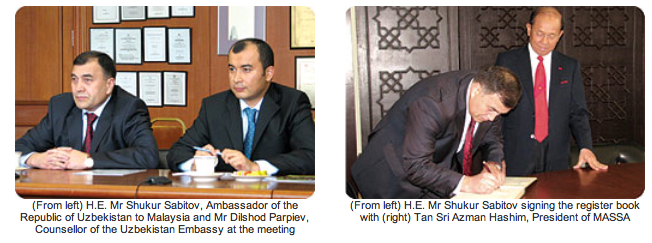
MASSA Members Visit Iskandar Malaysia, 11 March 2010
MASSA members, led by YBhg Tan Sri Dato’ Mohd Ramli Kushairi made a visit to Iskandar Malaysia on 11 March 2010. The delegation arrived at the Iskandar Regional Development Authority (IRDA)’s office at Danga Bay, Johor Bahru and was met by its Chief Executive Officer, Encik Ismail Ibrahim. Encik Ismail Ibrahim welcomed MASSA members and gave an introduction to Iskandar Malaysia and the present status of its development and progress. IRDA is a Federal Statutory Body established under the IRDA Act 2007. Its key functions are to plan, promote and facilitate investment approvals. It is responsible for realising the vision and objectives of Iskandar Malaysia to become a metropolis of international standing. IRDA provides a facilitative environment for investors by responding to their needs in a timely and transparent manner.
Iskandar Malaysia is set to become Southern Peninsular Malaysia’s most developed region, where living, entertainment, environment and business seamlessly converge within a bustling and vibrant metropolis.
Located in Johor, the southern gateway to Peninsular Malaysia, Iskandar Malaysia is only a six to eight hour flight radius from Asia’s burgeoning growth centres such as Bangalore, Dubai, Hong Kong, Seoul, Shanghai, Taipei and Tokyo. It is also within reach of a global market of 800 million people. Iskandar Malaysia aims to be a sustainable region of international standard. The beacon of new growth, Iskandar Malaysia will spur economic development that actuate Malaysia’s global potential. Recognising the need for sustainable development, social and environment issues feature heavily on its agenda.
The development of Iskandar Malaysia has been strategically planned with five flagship zones. They include:
- JB City Centre
- Nusajaya and Medini
- Western Gate development
- Eastern Gate development
- Senai – Skudai
The delegation was also briefed by representatives from Iskandar Investment Berhad (IIB) and UEM Land Holdings Berhad (UEM Land) on the status of the various development components mentioned above. The members went on a tour of the developments before ending the tour with a sumptious luncheon hosted by IRDA at the Horizon Hills Golf & Country Club in Iskandar Malaysia.
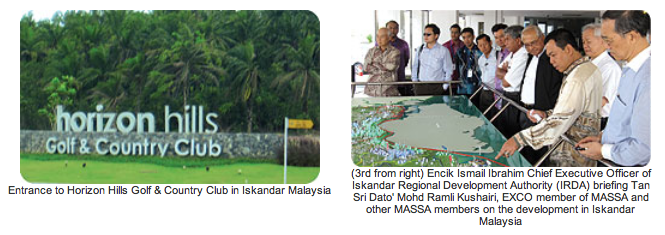
Courtesy Call by High Commissioner of Kenya on President of MASSA,
30 March 2010
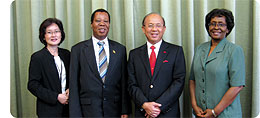 H.E. David Gachoki Njoka, High Commissioner of Kenya to Malaysia made a courtesy call on YBhg Tan Sri Azman Hashim, President of MASSA at his office. His Excellency was accompanied by Ms Noel Kituto, First Counsellor of the Kenya High Commission in Malaysia at this meeting.
H.E. David Gachoki Njoka, High Commissioner of Kenya to Malaysia made a courtesy call on YBhg Tan Sri Azman Hashim, President of MASSA at his office. His Excellency was accompanied by Ms Noel Kituto, First Counsellor of the Kenya High Commission in Malaysia at this meeting.
(From left) Ms Ng Su Fun, Executive Secretary of MASSA, H.E. David Gachoki Njoka, High Commissioner of Kenya to Malaysia, Tan Sri Azman Hashim, President of MASSA and Ms Noel Kituto, First Counsellor of the Kenya High Commission
Business Mission To Bangladesh 25 – 29 April 2010

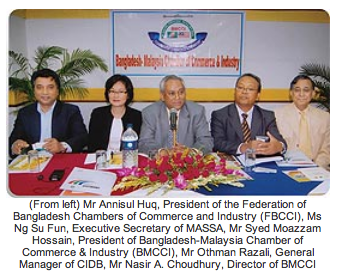 A Malaysian delegation recently completed a successful business mission to Bangladesh, covering the cities of Dhaka and Chittagong. The mission was jointly organised by the Construction Industry Development Board Malaysia (CIDB), Malaysia South-South Association (MASSA) and Federation of Malaysian Manufacturers (FMM), in collaboration with the Bangladesh-Malaysia Chamber of Commerce and Industry (BMCCI) and Bangladesh High Commission in Malaysia.
A Malaysian delegation recently completed a successful business mission to Bangladesh, covering the cities of Dhaka and Chittagong. The mission was jointly organised by the Construction Industry Development Board Malaysia (CIDB), Malaysia South-South Association (MASSA) and Federation of Malaysian Manufacturers (FMM), in collaboration with the Bangladesh-Malaysia Chamber of Commerce and Industry (BMCCI) and Bangladesh High Commission in Malaysia.
Spearheaded by Ms Ng Su Fun of MASSA and Mr Othman Razali, General Manager of CIDB, the mission comprised key personnel from various companies representing a wide range of business activities including engineering, construction as well as highway operations and management.
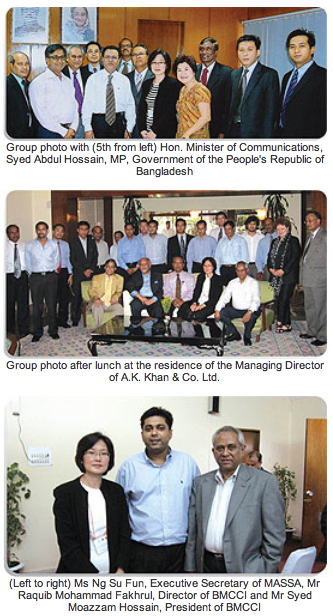 Mission objectives:
Mission objectives:
• To get to know the business environment in Bangladesh
• To explore business opportunities in the following areas:
• Infrastructure development and related services in the construction of roads, highways and bridges
• Relocation of Malaysian sunset industries
• Real estate and property development
• To connect and network with relevant government agencies, Bangladesh business people in related sectors and visit potential sites
• To meet with the Malaysian High Commissioner to Bangladesh and Malaysian business people in Bangladesh
The delegation was invited to engage in a series of meetings with Ministers, high-level Government officials and top leaders of various private sector groups. It was a fruitful trip indeed as it helped identify many potential business opportunities, especially in the following sectors.
Infrastructure: Power
Bangladesh is facing an acute power shortage and the government has made solving this issue a top priority with fast-track consideration for power plant deals.
Infrastructure: Highway, Railway and Road Construction
This sector presents numerous opportunities. Much investments to build roads, bridges, highways and railways are needed to meet the pace of its economic and industrial development.
Real Estate and Property Development
The delegation also met with representatives of the Real Estate and Housing Association of Bangladesh. The country has a huge population, with 13.5 million inhabitants in Dhaka City alone and 7 million in Chittagong. There is great shortage of affordable housing. Members of the Real Estate and Housing Association of Bangladesh as well as the Chittagong Development Authority (CDA) welcome Malaysian investment proposals in this area.
Manufacturing Industries: Relocation to EPZ and Economic Zones in Bangladesh
On a visit to the Secretary to the Government/Board Of Investment member of the Prime Minister’s Office, delegates were informed that the Government of Bangladesh welcome foreign investors to relocate to the Export Processing Zones. Bangladesh also has special economic zones to cater for investments that target the large domestic market.
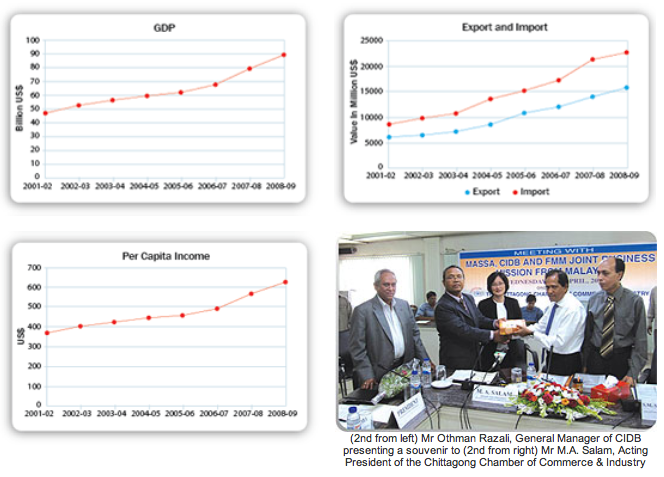
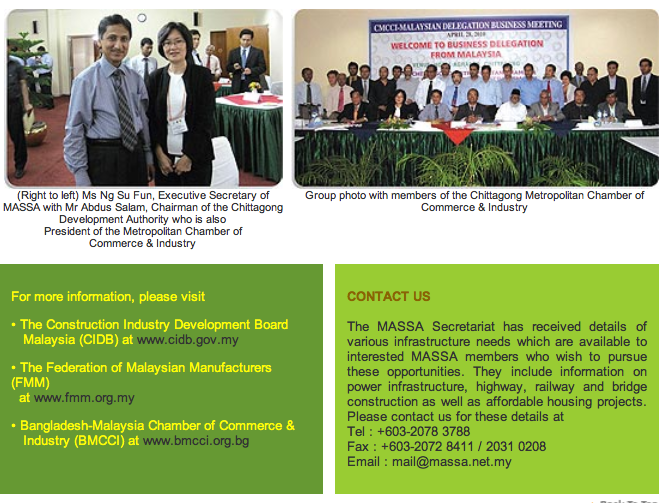
Bangladesh: Your Dream Investment Destination

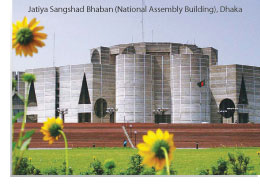 Overview
Overview
Strategically located next to India, China and the ASEAN markets, Bangladesh is indeed the perfect gateway to South East Asia. It is richly endowed with a variety of natural resources like gas, coal, stones and huge bodies of water.
It has a population of more than 144 million and is a largely homogenous society. Its people live in harmony, irrespective or race and religion. English is widely understood here and commonly used in both the public and private sectors.
Bangladesh’s competitiveness in terms of natural and human resources makes it the destination of choice for investors. Its robust economy and solid financial system provide a foundation for sustainable growth, creating a plethora of investment opportunities and great potential for exceptional returns.
Malaysian companies investing in Bangladesh can look forward to capitalising on the country’s business-friendly environment, political stability, low energy cost, strong local market, investment incentives, proven export competitiveness and investment protection.
Why Bangladesh?
- Industrious Low-cost Workforce: It boasts an educated, skilled and hardworking labour force with the lowest wages and salaries in the region.
- Strong Domestic Demand: A growing middle class with significant purchasing power makes Bangladesh a very attractive investment destination.
- Competitive Incentives: One of the most investment-friendly FDI regimes in South Asia, Bangladesh allows 100% foreign equity and an unrestricted exit policy.
- Low Cost of Energy: Energy prices are among the most competitive. Transportation on green compressed natural gas is less than 20% of the diesel price.
- Proven Competitiveness: Bangladeshi products enjoy tariff-free access to the EU, Canada, Australia and Japan.
- Modern Infrastructure: To ensure a better business environment, the country is focused on developing core infrastructures like roads, highways and port facilities.
Investment Opportunities
Despite the global economic slowdown, Bangladesh is on track to achieve 6% GDP growth this year – once again reinforcing its reputation as one of the most attractive investment destinations in the region.
There are several sectors which offer particularly attractive investment opportunities, from ship-building and ceramics to float glass and tourism. Key opportunities can be found in garment design and production, ICT business services, pharmaceuticals, agro processing and leather products.
Export Processing Zones
 There are currently 8 EPZs in Bangladesh, namely Dhaka, Adamjee, Comilla, Mongla, Chittagong, Karnaphuli, Ishwardi and Uttara. These export-oriented industrial enclaves provide infrastructural facilities and support services to foreign investors.
There are currently 8 EPZs in Bangladesh, namely Dhaka, Adamjee, Comilla, Mongla, Chittagong, Karnaphuli, Ishwardi and Uttara. These export-oriented industrial enclaves provide infrastructural facilities and support services to foreign investors.
Special incentives enjoyed by businesses located in the EPZs include:
- 10 years tax holiday
- Concessionary tax for 5 years, after 10 years
- Duty and tax free exports from the EPZ
- Ready-made factory buildings
- Excellent infrastructure logistics
- Duty free import of machinery, raw and construction materials
- Business and administrative support services
The Board Of Investment (BOI) works in tandem with the Bangladesh Export Processing Zone Authority (BEPZA) to assist foreign investors in setting up their business operations.
Public Private Partnership (PPP)
The Government is committed to increase private participation in the country’s infrastructure projects and public sector delivery. PPP opportunities are available in telecommunication and ICT infrastructure, highways and expressways, ports, power and energy, tourism, economic zones, social infrastructures, waste management, water supply and other infrastructure projects. The BOI is responsible for facilitating PPP projects.
Investment Incentives
- Corporate tax holidays from 5 to 7 years for selected sectors
- Accelerated depreciation on cost of machinery for new industries
- Reduced Corporate Tax for 5 to 7 years in lieu of tax holiday and accelerated depreciation
- Avoidance of double taxation under bilateral tax convention
- Tariff concessions
- Bonded warehousing facility
- Cash incentives/export subsidies
…and much, much more.

Contact Information
Board of Investment, Prime Minister’s Office
Jiban Bima Tower (19th Floor), 10 Dilkusha Commercial Area,
Dhaka 1000, Bangladesh.
Tel : +880-2-716 9580 Fax : +880-2-956 2312
Email : service@boi.gov.bd Website : www.boi.gov.bd
